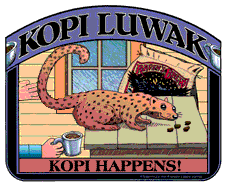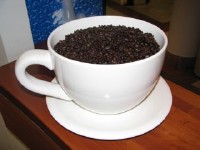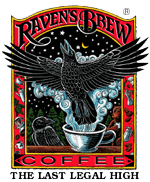 Good coffee is for many a life-elixir, already its aroma has a stimulating effect on us. Not surprisingly that a good coffee brand, for example Blue de Brazil or Peruvian Gold from South America has its price.
Good coffee is for many a life-elixir, already its aroma has a stimulating effect on us. Not surprisingly that a good coffee brand, for example Blue de Brazil or Peruvian Gold from South America has its price.
One variety of coffee however, is special due to its taste, its method of production and the relatively low amounts that can be generated because of that, and its price: From the isles of Indonesia, to be precise from Sumatra, Java, and Sulawesi, comes the coffee brand Kopi Luwak. Only 230 kilogram per year of this coffee are produced, which explains the price of about 700 US$/kg or seven US$ per cup.
 The palm civet paradoxurus lives on the isles of Indonesia. Since one of its preferred habits is to climb up the coffee trees in order to eat the especially ripe coffee beans, the palm civet was considered first as a pest for the crop and therefore as a plague for the locals who live from coffee.
The palm civet paradoxurus lives on the isles of Indonesia. Since one of its preferred habits is to climb up the coffee trees in order to eat the especially ripe coffee beans, the palm civet was considered first as a pest for the crop and therefore as a plague for the locals who live from coffee.
The palm civet however, cannot digest the coffee beans and excretes them more or less unchanged. The so processed beans could be easily collected from the ground. After peeling away the outer shell and roasting the inner nucleus it was realized that enzymes in the digestive system of the palm civet must have changed the taste of the beans in a unique way. Apparently, certain bitter tasting ingredients were extracted from the beans, and also certain proteins contained in them might have been degraded by proteases in the digestive tract of the palm civet.
 You have read correctly: the most expensive coffee beans in the world goes from the coffee tree first through the digestive system of the palm civet and only then to the roastery. But connoisseurs of Kopi Luwak are raving: The coffee has a unique full aroma with a sirup like chocolade taste.
You have read correctly: the most expensive coffee beans in the world goes from the coffee tree first through the digestive system of the palm civet and only then to the roastery. But connoisseurs of Kopi Luwak are raving: The coffee has a unique full aroma with a sirup like chocolade taste.
Since for the production of Kopi Luwak the elaborate collaboration of the cibet cats is necessary and the actual manufacturing process does not agree with everyone's taste, researches currently try to imitate the fermentation process in the laboratory. It is hoped that one could use bacteria present in milk - a technique that is already in use as the so-called wet process for some varieties of coffee. If this would be successful, Kopi Luwak certainly would become available much more broadly to a considerably reduced price, on the other hand the world would loose a unique manufacturing process for a coffee.
More information on Kopi Luwak, beautiful art pictures on coffee as well as a great variety of excellent coffees one can find at Raven’s Brew Coffee Inc.
Source for the pictures:
© Raven' Brew Coffee Inc. with kind permission.